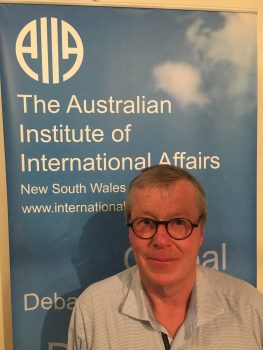Iran Today
At Glover Cottages on the 11th of July 2017 Andrew Ritchie, a member of AIIA NSW, presented on his experiences of Iran. Andrew was one of a group of twenty-four that participated in a sixteen day study tour organised by AIIA Victoria. The group visited and interacted with a variety of civil society organisations, and met with the Australian Ambassador to Iran, Ian Biggs.
In his presentation Andrew explored his interactions with general population. Andrew described the people as undergoing a civic and industrial awakening, particularly in the capital, Tehran. With a recent history of revolution and unrest, Iran finds itself in entangled with the powerful interests of government and religion. Andrew observed that the people express a generalised resentment of the government, while noting that such a sentiment is similar in many emerging countries with increasing access to information and globalised technologies such as the internet. Andrew predicted a positive trajectory for this process of increased civilian collective consciousness, rather than it contributing to future unrest. He attributed this largely to the scars of revolution that remain imprinted on Iranian society, which empowers the Islamic Revolutionary Guard. He also attributes it to a growing younger population of Iranians who are more technologically and internationally literate.

Iran is trying to navigate its way into a powerful position within its own region, the ‘West Asia’ regional block, though this goal has been significantly frustrated by international economic sanctions. During his trip, Andrew observed that the strict centralisation of the financial institutions, resulting from international sanctions, has had an asymmetric effect on the population. The general population, notably in regional hubs, are experiencing exponential increases in cost of living. This financial hardship compounds distrust in government, as the entanglement between state and religious power sources provides a convenient target to blame for the presence and impact of sanctions. While these sanctions have empowered national industries such as the automotive manufactures, the inability for the growth of these industries beyond Iranian territory restricts Iran’s economic and geopolitical growth. Andrew discussed the example of ‘One Belt One Road’ influence on Iranian growth, including that Iran will take a developmental approach to their integration with Chinese infrastructure.
Andrew confirmed that the pragmatic position held by both Iranian citizens and decision makers in regards to nuclear proliferation will be maintained, regardless of changes in power, because of the strategic importance it holds for both energy and security politics. Iran’s treatment of refugees was also discussed, with Andrew noting the presence of a play “Manus” which takes aim at Australia’s already tarnished reputation in regards to refugee policy.
Mitchell Travers